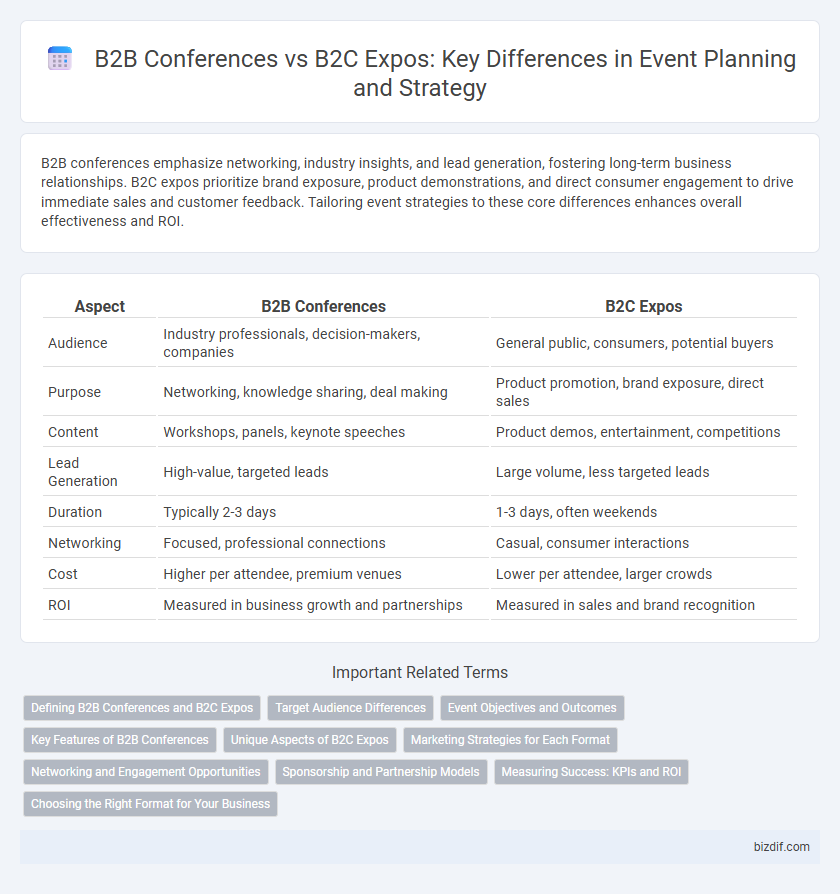B2B conferences emphasize networking, industry insights, and lead generation, fostering long-term business relationships. B2C expos prioritize brand exposure, product demonstrations, and direct consumer engagement to drive immediate sales and customer feedback. Tailoring event strategies to these core differences enhances overall effectiveness and ROI.
Table of Comparison
| Aspect | B2B Conferences | B2C Expos |
|---|---|---|
| Audience | Industry professionals, decision-makers, companies | General public, consumers, potential buyers |
| Purpose | Networking, knowledge sharing, deal making | Product promotion, brand exposure, direct sales |
| Content | Workshops, panels, keynote speeches | Product demos, entertainment, competitions |
| Lead Generation | High-value, targeted leads | Large volume, less targeted leads |
| Duration | Typically 2-3 days | 1-3 days, often weekends |
| Networking | Focused, professional connections | Casual, consumer interactions |
| Cost | Higher per attendee, premium venues | Lower per attendee, larger crowds |
| ROI | Measured in business growth and partnerships | Measured in sales and brand recognition |
Defining B2B Conferences and B2C Expos
B2B conferences are professional gatherings designed to facilitate networking, knowledge exchange, and deal-making among businesses within specific industries, focusing on targeted interactions and industry insights. B2C expos cater directly to consumers, showcasing products and services with the goal of driving sales, brand awareness, and customer engagement through interactive exhibits and demonstrations. Both event types require distinct planning strategies to effectively address their unique audience needs and engagement goals.
Target Audience Differences
B2B conferences primarily target industry professionals, decision-makers, and corporate representatives seeking networking and knowledge-sharing opportunities, focusing on niche markets and specialized content. In contrast, B2C expos cater to a broader consumer audience interested in product discovery, brand experiences, and direct purchasing options. Understanding these distinct target audiences guides event marketing strategies, content development, and engagement tactics.
Event Objectives and Outcomes
B2B conferences prioritize networking opportunities, lead generation, and knowledge sharing, aiming to establish long-term partnerships and business growth. B2C expos focus on brand exposure, consumer engagement, and direct sales, seeking immediate customer interaction and market feedback. Event objectives in B2B emphasize professional relationship building, while B2C outcomes target increased consumer awareness and product adoption.
Key Features of B2B Conferences
B2B conferences emphasize targeted networking opportunities, connecting industry professionals and decision-makers to foster partnerships and business growth. These events typically feature in-depth workshops, keynote presentations by experts, and panel discussions designed to provide actionable insights and thought leadership. Unlike B2C expos, B2B conferences prioritize creating value through relationship-building and knowledge exchange rather than direct product sales to consumers.
Unique Aspects of B2C Expos
B2C expos emphasize direct consumer engagement, featuring interactive product demonstrations and experiential marketing to enhance brand awareness. These events attract large audiences with diverse demographics, creating opportunities for immediate sales and customer feedback. Exhibitors often employ visually appealing booths and promotional giveaways to captivate consumers and foster loyalty.
Marketing Strategies for Each Format
B2B conferences require targeted marketing strategies emphasizing direct outreach, professional networking, and industry-specific content to attract decision-makers and foster partnerships. B2C expos benefit from mass marketing campaigns, social media engagement, and experiential activations designed to drive foot traffic and consumer interaction. Tailoring promotional efforts to the distinct audience profiles ensures higher engagement and measurable event success for both formats.
Networking and Engagement Opportunities
B2B conferences prioritize targeted networking by connecting industry professionals, fostering partnerships and knowledge exchange through focused sessions and workshops. B2C expos emphasize high-volume engagement with diverse consumer audiences, leveraging interactive booths and live demonstrations to boost brand visibility and customer interaction. The tailored networking in B2B settings facilitates deeper business relationships, while B2C events maximize broad-based consumer engagement and experiential marketing.
Sponsorship and Partnership Models
B2B conferences heavily rely on targeted sponsorship packages that offer brand visibility through keynote presentations, panel participation, and dedicated networking sessions tailored to industry stakeholders. In contrast, B2C expos emphasize broad-reaching partnership models, leveraging mass media exposure, product demonstrations, and consumer engagement zones to attract diverse sponsors. Both event types maximize ROI by aligning sponsorship tiers with audience demographics and engagement levels, ensuring strategic brand alignment and measurable impact.
Measuring Success: KPIs and ROI
Measuring success at B2B conferences centers on KPIs such as qualified lead generation, attendee engagement levels, and post-event deal closures, directly impacting ROI through long-term client acquisition and partnership development. In contrast, B2C expos prioritize metrics like foot traffic, brand awareness, and immediate sales conversions to evaluate ROI based on volume and customer reach. Both event types require tailored analytics to optimize budget allocation and enhance strategic outcomes effectively.
Choosing the Right Format for Your Business
Selecting the appropriate event format hinges on understanding target audiences: B2B conferences foster networking and industry-specific knowledge exchange among professionals, while B2C expos prioritize direct consumer engagement and product showcasing. Analyzing business objectives, budget, and desired outcomes helps determine whether interactive workshops and panel discussions or experiential marketing and brand activations better align with your goals. Leveraging data on attendee demographics and behavioral insights ensures maximized ROI and impactful event experiences tailored to either corporate partnerships or end-user connections.
B2B conferences vs B2C expos Infographic

 bizdif.com
bizdif.com